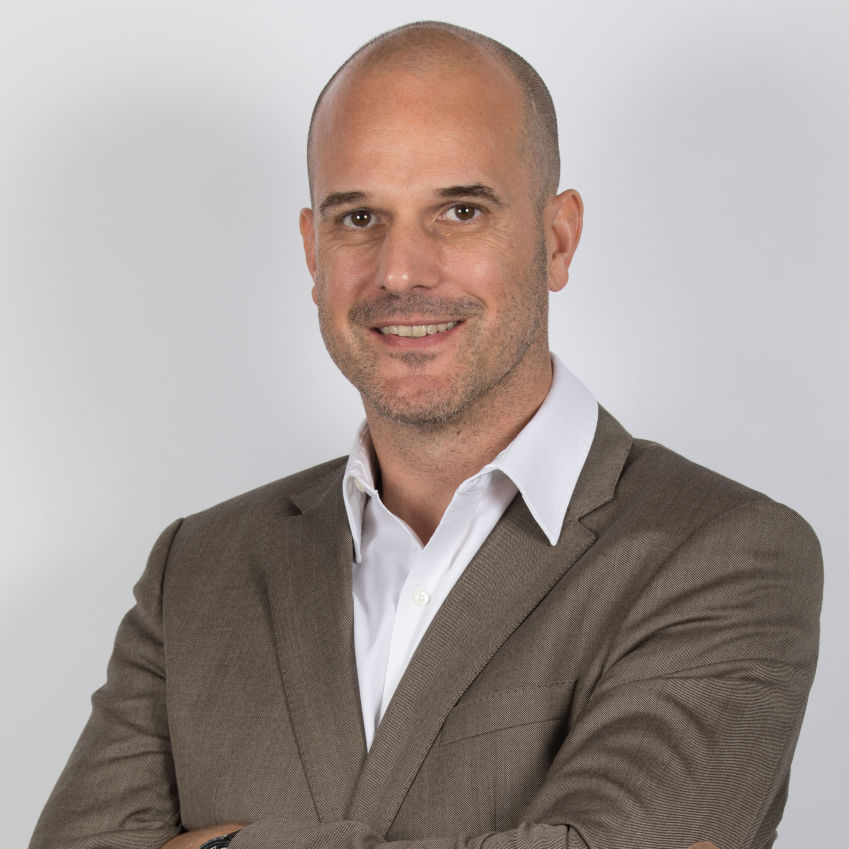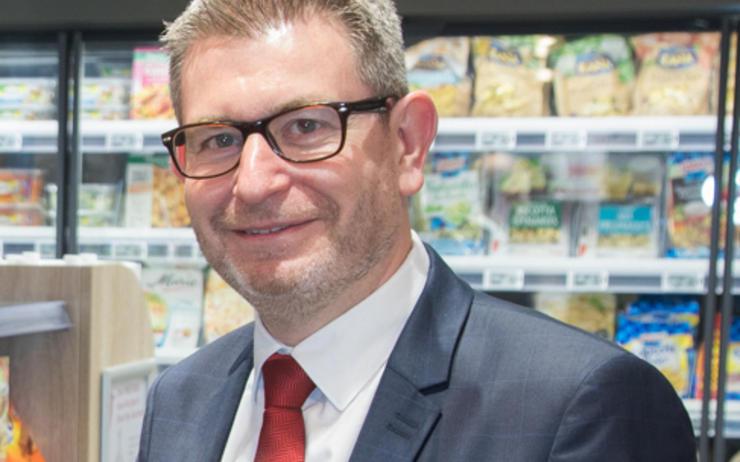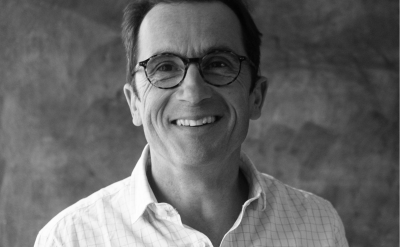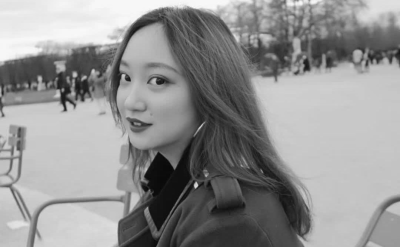Have you always wanted to work in marketing and communications?
Nicolas Roux: Yes, it’s instinctive; I’ve always wanted to do this. After my studies at SKEMA in Nice, I started in London on a VSNE programme (today’s equivalent is VIE or Volunteer for International Experience, ed) for two years for the economic development agency Cote d’Azur Développement. I had to promote the advantages of Sophia-Antipolis and attract foreign companies. It was highly targeted to the IT, tech and major laboratory sectors – all of them high-growth industries. This hands-on experience made me realise that my English wasn’t really up to par (laughs).
Did this first English experience make you want to pursue your career abroad?
If there is one common theme throughout my career, it’s that I’ve always gone for companies or locations that are booming, where things are happening. After a fantastic 2-year experience, I wanted to change companies. I needed a mentor to progress. I needed something else but wanted to stay in communications. London was a great place for advertising, at the heart of European growth. But I got an offer in Dubai and I didn’t think twice about going.
Did you immediately like the Emirates?
I arrived in 1999, at the start of the Dubai boom; you could already feel what was going to happen. The massive property development projects were under way; the place held a lot of appeal for business, whereas at the end of the 1990s Europe was in more of a recession. Being young and single, heading to Dubai was an easy risk to take.
I was hired by Euro RSCG, an advertising agency in the Chalhoub group, which represents all the major European luxury groups in the Emirates. I was in a very stimulating environment. My role was both sales-focused and creative: I was selling advertising and media strategies to clients. One big advantage was that I got exposure to the entire palette of communications activities where normally this line of work is highly segmented. I worked hand in hand with the creative teams and the media planners. I learned a lot.
Would you say expatriation is one of the reasons for your rapid career success?
Yes, I don’t think I would have ever been given these responsibilities so quickly in Paris. One great thing about expatriation is that roles are les segmented and have more responsibilities. Our tasks were less specialised; we could take more initiative and even make mistakes. In hindsight, there was less hierarchy. I learned a lot faster and grew up faster.
But overseas you work a lot longer hours than in France, so that’s the flip side. We worked long days, we finished late, we sometimes worked on weekends… the environment was young, very refreshing. And the industry was burgeoning in the 2000.
You then changed agencies…
I went over to Leo Burnett with the aim of “going back to university”, to get back into pure marketing. At the time it was a fantastic school for FMCG (Fast-Moving Consumer Goods). I worked on Philip Morris and P&G, two FMCG heavyweights; most notably, I looked after Marlboro and Gillette in the MENA region. I stayed there 10 years.
In advertising, adapting messages to consumers is critical…
There’s no doubt about it. In this part of the world you have to take into account the local and Islamic culture, even if some of them are very open and modern like in the Emirates. You have to be careful to respect their values, for example when using the image of a woman or religious events in campaigns. This pushed us to develop local marketing solutions rather than copycatting strategies developed in Paris or London. It’s a lot more stimulating and interesting!
How do you entice a consumer to buy a product? Can the fact that you’re not a local be a handicap in this case?
The beauty of the companies for which I’ve worked in the Emirates is the ethnic mix. On average, I am surrounded by 30 different nationalities. As a Frenchman, I’m very much a minority. Far from being bothered by this, I found it enriching to work with people from Lebanon, India, England, Egypt, South Africa, Australia… and the list goes on. There are different approaches to enticing a consumer to buy. The role of the product, its purpose and its “lifestyle” impact become essential, as does the way to put it forward. If you take the case of cosmetics, industry professionals usually base their communication on a stunning model in the company of the product and launch the campaign (even if things are changing for the better in this regard in Europe and the United States). In Dubai, that isn’t impossible. So we become a lot more creative; it forces us to come up with more complex and original content and media strategies.
You quickly understood the usefulness of digital communication. Why is that?
It was becoming more and more difficult to communicate about tobacco, for example, using traditional media, due to issues with mass targeting (exposing your communication to minors or non-smokers). So at Philip Morris we were the first to use digital communication and its biggest advantage: laser-precision targeting. This enabled me to integrate a new growth channel and, very early on, to use the potential of digital channels, to develop new marketing solutions for a brand.
At the same time, I was working a lot with media agencies from the Publicis group, which Leo Burnett was a part of. The media agencies were taking more and more control of the digital sector. I was attending joint meetings where discussions were becoming increasingly technical and about topics that fell outside the scope of my digital knowledge. To avoid becoming obsolete, I decided to leave the creative agency world for media agencies, which were the most likely to be at the centre of the growth.
In 2012, I joined GroupM and MediaCom in Dubai; I was in charge of new business development and marketing for the region, with a strong focus on digital transformation, the driver of growth.
I was schooled in marketing with Leo Burnett and Philip Morris. The media agency was my digital school. I wanted to learn again and to reinvent myself in an ultra-dynamic environment.
You talk a lot about the joy of learning and it seems to have been a big factor in your career choices…
Innovation and learning go together. I don’t do well with routine. Learning in a sector that interests you, using your knowledge daily… that is motivating. My teams had to come up with communication strategies, media plans, creative plans, but these had to be built and sold, and for this we had to have full mastery of the digital aspect!
What’s more, digital made up 80% of our revenue; that’s where we made our profits. And every day, new technologies and players are appearing. You have to be learning constantly to keep up.
When the agency business model started to collapse, I joined LinkedIn. For me it was a logical decision. Tech companies are coming into power. This is where growth is being distributed and they’re the way of the future.
Always this drive to follow growth!
The acquisition by Microsoft was announced on my first day at Linkedin! The two companies remain independent, but it’s rather fascinating to witness Linkedin’s strategic integration in Microsoft products and solutions. This multiplies Linkedin’s potential. And it gives the possibility of targeting audiences all the way along a digital path and in a professional context.
Not everything is perfect, but incredible things are happening in artificial intelligence. Microsoft is working on quantum mechanics, cancer research, etc… well beyond Office and their Cloud solutions. These companies enjoy insane growth and have real roles to play in our societies.
What is your role at Linkedin?
I look after partnerships with key accounts and media, digital and creative agencies. 80% of our business goes through agencies for our marketing products.
We allow brands, on premium B2B and B2C, to target the right audiences at the right time and with the right content, in a professional context.
Did you imagine that you'd stay 15 years in Dubai?
No, I came here for 3 years! And then I met my wife and we had children… I stayed because there were a lot of opportunities. The place is constantly reinventing itself. Life here is very interesting. Things are changing in the region but the Emirates are still the only reliable platform in the Middle East. Soon there will be 13 million inhabitants (compared to 3.5 when I arrived!) I am in a wonderful melting pot. There aren’t many places in the world like this. My children go to French school, because my wife is English. I wanted them to speak flawless French. They really like it there. They are learning Arabic; they are effortlessly bilingual… That is another advantage of expatriation. It gives them an open-mindedness they will have all through life.
What would you like to say to students who are about to enter the workforce?
Your first job will have a massive influence on your life and your career, because it is increasingly difficult to change industries and we are becoming more and more specialised. Choose it carefully! Or have a main theme that is a source of transformation. For me that was digital.
Lastly, if you want to go abroad, do it straight away! It’s more difficult once you have a partner that works, children… While you’re young you’ll have less pressure and a lot more opportunities (and you cost the company less)… And you’ll be allowed to make mistakes.








